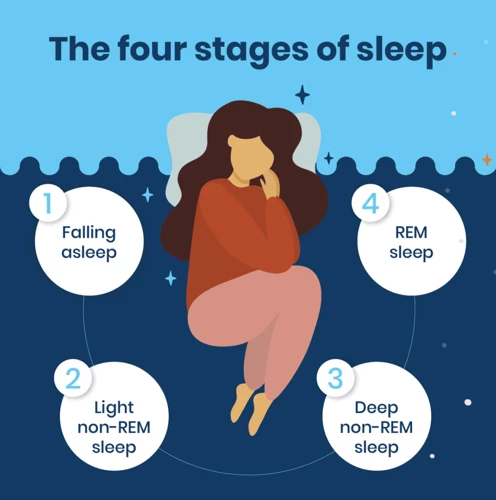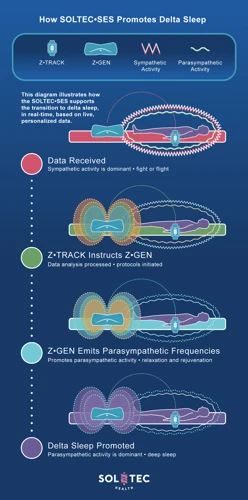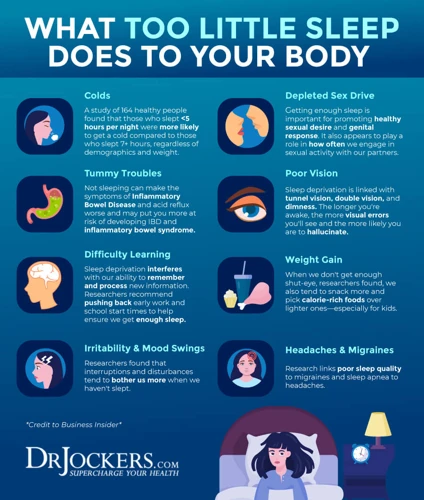As we go about our day, our body and mind work tirelessly, using up energy and resources. At the end of the day, a good night’s rest seems like a well-deserved reward. But did you know that not all sleep is created equal? Deep sleep, also known as slow-wave sleep, is crucial for physical and mental rejuvenation. It is during this phase of sleep that our body repairs and restores itself, and our brain consolidates memories and processes emotions. However, with our busy modern lives, getting enough deep sleep can be a challenge. Let’s dive deeper into why deep sleep is essential and how we can improve our sleep quality.
What is Deep Sleep?

As we close our eyes and enter the realm of sleep, our brain waves begin to slow down, and we shift through different stages of sleep. However, for many, the benefits of sleep may evade them if they fail to reach the crucial stage known as deep sleep. But what exactly is deep sleep, and why is it so important? Understanding the specifics of this stage of sleep can yield long-lasting physical and mental benefits for our well-being.
The Stages of Sleep
During sleep, our brain goes through several stages, each with its own unique characteristics and benefits. Understanding these stages is important in recognizing the importance of deep sleep.
NREM Stage 1: During this stage, we begin to drift off to sleep and experience a slowing down of brain activity. This stage usually lasts only a few minutes and is characterized by the feeling of drowsiness.
NREM Stage 2: This is the longest stage of sleep, accounting for about half of the total sleep time. During this stage, our body and brain continue to relax, and we become less aware of our surroundings. Our heart rate and breathing slow down, and our body temperature drops.
NREM Stage 3: During this stage, also known as slow-wave sleep, our brain waves slow down even further, and our breathing becomes even more regular. Our muscles relax, and it becomes difficult to wake up. This is the stage of sleep where deep sleep occurs.
REM Stage: During this stage, our brain becomes more active, and we experience vivid dreams. Our eyes may move rapidly, and our heart rate and breathing may become more irregular. This stage usually occurs in cycles throughout the night, becoming longer with each cycle.
Understanding the different stages of sleep is crucial in understanding the benefits of deep sleep. During NREM Stage 3 or slow-wave sleep, our body and brain undergo important processes that are essential for physical and mental rejuvenation.
The Benefits of Deep Sleep
Deep sleep, also called slow-wave sleep or Stage 3 sleep, is a crucial component of the sleep cycle. During deep sleep, the body and brain undergo numerous beneficial processes that contribute to physical and mental rejuvenation. Here are some of the benefits of deep sleep:
– Restoration and growth of body tissues: Deep sleep is crucial for the restoration and growth of body tissues. During this stage of sleep, the body releases growth hormone, which stimulates tissue repair and growth. This hormone is especially important for children and adolescents, as it helps them grow and develop normally.
– Consolidation of memories: Good-quality sleep, including deep sleep, helps the brain consolidate memories and process information learned throughout the day. This process is known as memory consolidation and is vital for learning and retaining new information.
– Emotional regulation: Deep sleep is also important for emotional regulation. It helps to stabilize mood and reduce negative emotions, such as anxiety and depression.
– Improved creativity and problem-solving abilities: Research has shown that deep sleep can enhance creativity and problem-solving abilities. During this stage of sleep, the brain forms connections between seemingly unrelated pieces of information, which can lead to new insights and ideas.
– Increased physical energy: Deep sleep helps to restore physical energy by repairing and rejuvenating the body’s tissues and muscles. This can lead to increased stamina and better physical performance.
Deep sleep is not just a period of rest; it is a time when the body and brain undergo important processes that contribute to overall physical and mental health. By understanding the benefits of deep sleep, we can better appreciate the importance of getting good-quality sleep on a regular basis.
Physical Rejuvenation

When it comes to rejuvenation, physical health is just as important as mental health. Our body undergoes stress and wear and tear throughout the day, and it’s during our deep sleep that it works hard to repair and restore itself. This is why attaining deep sleep is crucial for physical rejuvenation. Let’s explore some of the ways that deep sleep helps our bodies heal, and how we can achieve the best possible results through optimal sleep.
Consolidation of Memories
During deep sleep, a process called memory consolidation occurs. This process involves the transfer of short-term memories to long-term storage in the brain. This means that the things we learn or experience during the day are cemented into our memory during deep sleep.
Memory consolidation is influenced by a variety of factors, including the type of memory being consolidated and the amount of sleep a person gets. In general, however, research has shown that deep sleep is critical for memory consolidation.
A study published in the journal Nature Neuroscience found that participants who had a good night’s sleep after learning a new task performed better on the task the next day compared to those who stayed awake or had a restless night’s sleep. This is because during deep sleep, the brain replays the neural activity associated with the task, strengthening the connections between neurons and improving recall.
Another study published in the journal Sleep found that individuals who got more deep sleep after studying a list of words were better able to recall the words later on.
These studies and others like them suggest that deep sleep is crucial for memory consolidation and retention. Getting enough deep sleep can help us remember important information and perform better on tasks the next day.
Table: Factors affecting Memory Consolidation during Deep Sleep
| Factor | How it Affects Memory Consolidation |
|---|---|
| Amount of deep sleep | More deep sleep is associated with better memory consolidation and retention |
| Timing of deep sleep | Deep sleep that occurs closer to the time of learning is more effective for memory consolidation |
| Type of memory | Some types of memory, such as motor skills, may benefit more from deep sleep than others |
| Age | As we age, we tend to get less deep sleep, which can impact memory consolidation and retention |
Repair and Restoration of Body Tissues
During deep sleep, the body undergoes a repair and restoration process that helps to mend any wear and tear that occurs in our body tissues during our daily activities. This is especially important for athletes, workout enthusiasts, and those who lead an active lifestyle. The following are some of the ways in which deep sleep aids in the repair and restoration of body tissues:
- Boosts Growth Hormone Production: Deep sleep contributes to the production of growth hormone, which plays a vital role in tissue repair and regeneration.
- Reduces Inflammation: Inflammation is a natural process that occurs in the body to protect damaged tissue. Prolonged inflammation, however, can lead to chronic conditions such as arthritis and heart disease. Deep sleep reduces inflammation, thereby aiding in the repair of damaged tissues.
- Improves Muscle Recovery: During deep sleep, the body produces more adenosine triphosphate (ATP), which is essential for muscle recovery and repair. This is especially important after an intense workout or physical activity.
In addition to promoting tissue repair and restoration, deep sleep also helps to strengthen the immune system. This is important because a strong immune system is better equipped to fight off infections and diseases. It is crucial to prioritize getting enough deep sleep to maintain an optimal level of physical health.
Mental Rejuvenation

As important as physical rejuvenation is for maintaining a healthy lifestyle, mental rejuvenation is equally vital. Finding time to recharge is essential to maintaining your overall well-being, and deep sleep plays a critical role in this process. While we often think of sleep as a time of rest and restorative healing, deep sleep is where our brains do some of their most important work. During this stage of sleep, our brains process and consolidate memories, regulate our emotions, and help us sharpen our problem-solving skills. Let’s take a closer look at why deep sleep is crucial for mental rejuvenation.
Emotional Regulation
One of the most important benefits of deep sleep is its impact on emotional regulation. During this stage, the brain processes and consolidates emotions, which is crucial in maintaining good mental health. When we don’t get enough deep sleep, our emotional responses can become erratic and disproportionate to the situation at hand.
Studies have shown that a lack of deep sleep can lead to increased activity in the amygdala, which is responsible for processing emotions such as fear and anxiety. This can cause individuals to feel more stressed, anxious, and irritable throughout the day, which can negatively impact their relationships and overall well-being.
On the other hand, getting enough deep sleep can help regulate emotions and improve mood. Deep sleep helps to decrease activity in the amygdala, while increasing connectivity between the prefrontal cortex and the amygdala. This provides a more balanced emotional response and improves the ability to regulate emotions.
It is important to note that emotional regulation isn’t just important for individuals with mental health concerns. Everyone can benefit from improving their ability to regulate emotions, and deep sleep is a crucial part of achieving this.
| Benefits of Emotional Regulation: | Consequences of Poor Emotional Regulation: |
|---|---|
|
|
It is imperative to prioritize deep sleep as a key component of overall emotional well-being.
Improved Creativity and Problem Solving
During deep sleep, our brain is extremely active, and this activity stimulates creativity and problem-solving abilities. Studies show that individuals who get adequate deep sleep are more likely to have improved creativity and problem-solving skills.
Here are some reasons why deep sleep is crucial for improved creativity and problem-solving:
- Memory consolidation: During deep sleep, the brain strengthens and consolidates memories, which plays a crucial role in learning and problem-solving. It helps the brain to identify patterns, analyze data, and make connections that are critical for creative and innovative thinking.
- Restoration of neural pathways: During deep sleep, neural connections within the brain are restored, which enhances cognitive functioning, learning, and problem-solving capabilities.
- Reduced cognitive load: Deep sleep reduces the cognitive load on the brain, which refers to the mental effort required for processing information. This allows the brain to focus on creative and problem-solving tasks more effectively.
- Brain detoxification: During deep sleep, the brain flushes out toxins, including beta-amyloid, which is associated with Alzheimer’s disease. This detoxification process improves brain health and cognitive functioning, which leads to better problem-solving and creative thinking abilities.
Deep sleep plays a vital role in improving creativity and problem-solving abilities. Memory consolidation, restoration of neural pathways, reduced cognitive load, and brain detoxification are some of the reasons why deep sleep is crucial for mental rejuvenation. It is essential to prioritize getting adequate deep sleep to enhance creative and innovative thinking, and problem-solving skills.
Factors Affecting Deep Sleep

As important as it is, deep sleep can be elusive for some people. There are many factors that can affect the quality of our sleep and decrease the amount of time we spend in deep sleep. These factors can be environmental, emotional, physiological, or even related to our daily habits. Understanding these factors is crucial for developing healthy sleep habits and achieving optimal physical and mental rejuvenation. Let’s take a closer look at some of the most common factors affecting deep sleep.
Stress
Stress is one of the major factors that can have a significant impact on the quality of our sleep. When we are under stressful situations, our body releases cortisol, which is a hormone that helps us deal with the stress. However, if cortisol levels remain high for an extended period, it can disrupt our sleep patterns and cause insomnia.
Here are some ways in which stress affects our sleep:
- Difficulty Falling Asleep: When we are stressed, our mind remains active, and we find it challenging to relax and fall asleep. Racing thoughts, worry, and anxiety can keep us up at night, making it challenging to get the deep sleep we need.
- Wakefulness: Stress can cause frequent awakenings at night, making it difficult to stay asleep. Even a brief moment of wakefulness can disrupt the sleep cycle, affecting the quality of deep sleep.
- Reduced REM Sleep: Rapid Eye Movement (REM) sleep is essential for cognitive restoration, emotional regulation, and memory consolidation. However, high levels of stress can reduce the time we spend in REM sleep, reducing the benefits of deep sleep.
- Decreased Sleep Efficiency: Sleep efficiency is the time we spend asleep compared to the total time we spend in bed. When we are stressed, our sleep efficiency reduces, making it difficult to get the full benefits of deep sleep.
Reducing stress levels can help improve the quality and quantity of our deep sleep. Relaxation techniques such as yoga, meditation, and mindfulness can help calm the mind and reduce stress levels. Engaging in physical activity during the day can also help reduce stress and promote deep sleep at night.
It’s essential to create a peaceful sleep environment that is conducive to deep sleep. Avoiding stimulating activities before bedtime and creating a relaxing bedtime routine can help prepare the body for restful sleep. Making these small changes to prioritize and improve deep sleep can have significant long-term impacts on your physical and mental health.
Diet and Exercise
Maintaining a healthy diet and engaging in regular exercise can have a significant impact on the quality of deep sleep that you experience. A diet that is high in saturated fats and processed foods can disrupt the body’s natural sleep cycle and make it more difficult to fall into a deep sleep state. On the other hand, a diet that is rich in nutrients, such as fruits, vegetables, and whole grains, can promote better sleep quality.
Similarly, regular exercise can promote deeper sleep by reducing stress levels and promoting relaxation. However, it is important to note that engaging in exercise too close to bedtime can have the opposite effect and disrupt sleep patterns.
In addition to diet and exercise, it is important to limit caffeine and alcohol intake as they are known to disrupt sleep cycles. Strong caffeine and alcohol consumption can also lead to decreased water intake which can result in dehydration that can interfere with prompt body recovery during deep sleep.
It is imperative to maintain proper diet and exercise routine to aid the body’s natural sleep cycle and promote a higher quality of deep sleep.
| Factors Affecting Deep Sleep | How it affects deep sleep |
|---|---|
| Poor diet | Disrupts natural sleep cycle |
| Processed foods | Inhibits the body’s natural sleep cycle |
| Caffeine | Disrupts sleep cycle and decreases water intake |
| Alcohol | Disrupts sleep cycle and decreases water intake |
| Lack of exercise | Increases stress levels and decreases relaxation |
| Exercising too close to bedtime | Can lead to disrupted sleep patterns |
Ways to Improve Deep Sleep
When it comes to improving deep sleep, there are several strategies that you can implement in your daily routine that can help promote a more restorative and restful slumber. These techniques range from simple lifestyle changes to incorporating natural sleep aids into your pre-sleep routine. By employing these methods, you can help ensure that you are getting the most out of your sleep and allowing your body to fully recuperate every night. Let’s dive deeper into some of the ways you can improve your deep sleep quality.
Sleep Hygiene Tips
Good sleep hygiene is essential for getting the most out of your deep sleep. Here are some tips to help you improve your sleep hygiene:
| Stick to a consistent sleep schedule | Go to bed and wake up at the same time every day, even on weekends. |
| Create a relaxing bedtime routine | Do something calming and relaxing, such as reading or taking a warm bath, before bed to signal to your body that it’s time to sleep. |
| Make your bedroom comfortable | Ensure that your bedroom is quiet, cool, and dark. Use comfortable bedding and a pillow that supports your head and neck. |
| Avoid stimulating activities before bed | Avoid using electronic devices, such as phones or tablets, before bed. Their blue light can interfere with your body’s natural sleep-wake cycle. |
| Avoid caffeine, nicotine, and alcohol before bed | Caffeine and nicotine are stimulants that can interfere with sleep, while alcohol may make you drowsy but can disrupt sleep later on in the night. |
| Exercise regularly | Regular exercise can help improve the quality of your sleep, just make sure to finish your workout several hours before bedtime. |
| Manage your stress | Stress and anxiety can interfere with sleep. Try relaxation techniques, such as meditation or deep breathing, to manage your stress levels. |
By following these sleep hygiene tips, you can improve your chances of getting a good night’s sleep and increasing the benefit you get from your deep sleep. Remember, it’s not just the quantity of your sleep that matters, but also the quality!
Natural Sleep Aids
When it comes to improving deep sleep, there are several natural sleep aids that can be helpful. Here are some examples:
- Herbal teas: Drinking chamomile or valerian root tea before bedtime can promote relaxation and improve sleep quality.
- Aromatherapy: Using lavender essential oil in a diffuser or adding a few drops to a warm bath can have a calming effect and aid in sleep.
- Magnesium: This mineral can help relax muscles and promote a sense of calm. Adding magnesium-rich foods like spinach or almonds to your diet, or taking a magnesium supplement, can be beneficial.
- Melatonin: This hormone is naturally produced by the body and helps regulate sleep-wake cycles. Taking a melatonin supplement can be helpful for individuals who have trouble falling asleep.
- White noise: Using a white noise machine or app can help create a peaceful sleeping environment and block out distracting sounds.
It is important to note that while natural sleep aids can be helpful, it is best to consult with a healthcare professional before trying any new supplements or remedies. Additionally, focusing on creating a consistent sleep routine and practicing good sleep hygiene habits can also contribute to improved deep sleep.
Conclusion
In conclusion, it can be said that the importance of deep sleep cannot be overstated when it comes to overall physical and mental health. Getting enough deep sleep is crucial for the body to repair, rejuvenate, and restore itself. During this stage of sleep, the body and brain are able to engage in important functions such as memory consolidation, tissue repair, and emotional regulation.
However, many factors can affect the quality and quantity of deep sleep that a person gets, such as stress, diet, and exercise. It is important to identify and address these factors in order to improve sleep and overall health.
There are various ways to improve deep sleep, such as practicing good sleep hygiene, incorporating natural sleep aids, and seeking help from medical professionals if necessary. By prioritizing deep sleep, individuals can improve their physical and mental well-being and ultimately lead happier, healthier lives.
In short, deep sleep is crucial for physical and mental rejuvenation, and taking steps to improve the quality and quantity of it should be a top priority for anyone looking to improve their overall health and well-being.
Frequently Asked Questions
What happens when we sleep?
During sleep, our body goes through cycles of different sleep stages, each with its own unique purpose and benefits.
What is the function of deep sleep?
Deep sleep is crucial for physical and mental rejuvenation, as it aids in memory consolidation, tissue repair, and regulation of emotions.
How much deep sleep do we need?
The amount of deep sleep varies depending on age, with adults typically needing around 1.5 to 2 hours of deep sleep each night.
What are the consequences of not getting enough deep sleep?
Lack of deep sleep can lead to a range of health issues, including impaired cognitive function, weakened immune system, and increased risk of mental health disorders.
What are some common factors that affect deep sleep?
Stress, diet, exercise, and use of electronic devices before bed are all known to negatively impact the quality of deep sleep.
How can stress affect deep sleep?
Stress can cause the body to produce higher levels of cortisol, which can interfere with the natural sleep cycle and reduce the amount of time spent in deep sleep.
Can diet improve deep sleep?
Eating a balanced diet that is rich in sleep-promoting nutrients, such as magnesium and tryptophan, can help improve the quality of deep sleep.
What are some natural sleep aids that can improve deep sleep?
Herbs like chamomile, valerian root, and lavender are known for their calming properties and can help promote deep, restful sleep.
What is sleep hygiene?
Sleep hygiene refers to the practices and habits that can promote better quality sleep, such as establishing a consistent sleep routine and creating a comfortable sleep environment.
How can I improve my deep sleep?
Improving deep sleep involves making lifestyle changes such as reducing stress, improving diet and exercise, and establishing healthy sleep hygiene practices.








